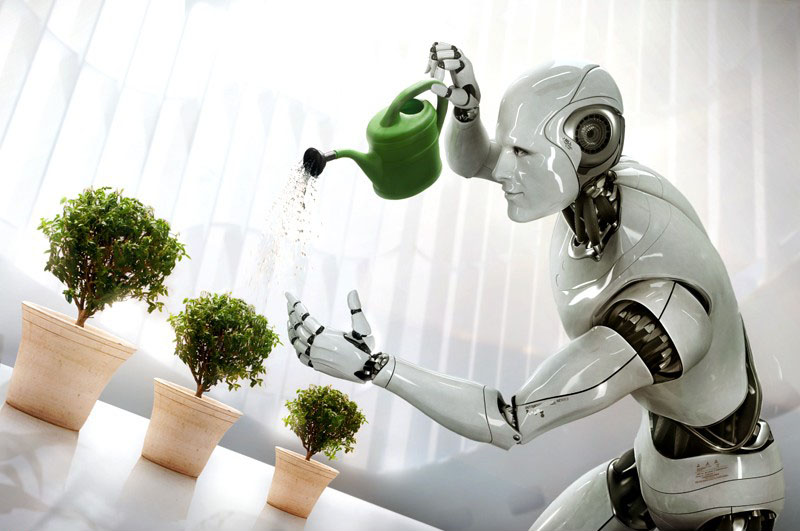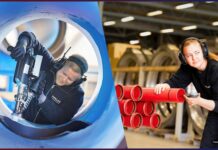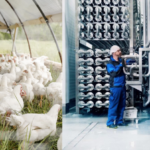We are wildly optimistic about the future and genuinely believe that we have entered a dramatically new era of artificial intelligence innovation. But what if we listen to experts who say that the rise of robots could lead to unemployment rates greater than 50 per cent? And given what little we know about our own minds, how can we expect to intentionally create artificial consciousness?
Every human used to have to hunt or gather to survive – but humans are smart, or perhaps lazy, so we made tools to make our work easier. From sticks to tractors, we have gone from everyone needing to make food – to modern agriculture with almost no one needing to make food. And yet we still have abundance.




Of course, it is not just the farm industry: it is everything. We spent the last thousands years building tools that reduce physical labour of all kinds. These are mechanical muscles; stronger, more reliable and more tireless than human muscles ever could be. And that might arguably be a good thing, for replacing human labour with mechanical muscles frees people to specialize.
Economy grows and the standard of living rises. Some people have specialized to be programmers and engineers who ́s job is to build mechanical minds. Just as mechanical muscles made human labour less in demand, so are mechanical minds making human brain labour less in demand. This is a revolution. But is this new?
The Greeks and the Chinese conceived the idea about artificial intelligence and mechanical humans for more than two thousand years ago. Already in 320 BC, Greek philosopher Aristotles made this famous quote, where he imagines the utility of robots, writing: “If every tool, when ordered, or even of its own accord, could do the work that befits it… then there would be no need either of apprentices for the master workers or of slaves for the lords.” And in 1495 Leonardo da Vinci sketched plans for a humanoid robot. Just to mention a few examples.
Although the ideas have been around for a while, people seem to claim that the 21st century, and from the year 2016 is when artificial intelligence and robots are making its big breakthrough. We have seen how personal computers and smart-phones have already changed our lifestyles. After the information age, intelligent robots may be the “next big thing” to change our lives again. So the question is, how far away are we really from having robots to perform tasks for our everyday life? And when will they start to form thoughts of their own?


Firstly, can you explain to me how a machine can think? I ask Dr. Axel Tidemann, PhD in artificial intelligence from NTNU.
– The same way humans can, by having a distributed system of simple processing units, he says.
While automation is already replacing many jobs, from bank tellers to taxi drivers, Tidemann doesn’t believe we need to start to think about making laws to protect these industries yet.
– No, I believe intelligent machines will make jobs obsolete, but that will mean we humans can focus on what we do best.
Focus on what?
– Humans are very good at creating, thinking differently, and being emotional, for instance. Imagine a nurse robot that could do the heavy lifting of patients and getting their medications, but a human nurse that would have more time to take actual care of the patients. Or a painter that wants to paint the exterior of an entire house in specific patterns. The painter could then show the robot what kind of patterns the robot should paint, and the robot could then do the actual work.
– In five-to-ten years we will se an increase in the use of AI in many services and industries. Many will be behind the scenes, like digital assistant such as Siri, Cortana and M will understand what you are saying and act accordingly. And we will also most likely have self-driving cars.
How plausible is human-like artificial intelligence, such as the kind often seen in films and on TV?
– Human-like AI is plausible, but I don ́t subscribe to the Hollywood dystopian view of the future, he says. – I see AI as an immense benefit to human society, which will bring about positive changes, such as making us more efficient and more environmentally friendly.
Given what little we know about our own minds, can we expect to intentionally create artificial consciousness?
– That ́s a good philosophical approach. How can we build something smarter than ourselves when we don ́t really understand how the brain works? Tidemann asks.
– We do have some idea of what the brain does, the interplay of neurons and synapses, but how the brain self-organizes itself is harder to grasp. I still think we can achieve artificial conscious- ness by understanding basic principles, where intelligence is judged by behaviour, he says.
So, should we be making AI that behaves like humans?
– Yes, but the good, kind and nurturing type.
– Humans also have a destructive side, and this kind of capability is not needed in an AI that behaves like humans. Lots of the fear for AI comes from exactly this point of view; that something super-human could be super-evil. Why not think it good do super-good instead, and equip the AI accordingly?
But, should we be concerned about military and armed robots? Is there a danger of trusting robots?
– We should be more concerned about those building the military robots, since technology can always be abused in the wrong hands. There are measures taken to mitigate this issue, OpenAI, backed by Elon Musk, that seeks to spread the knowledge of AI so that everyone will have access to it.
Are you generally optimistic about the long-term future of artificial intelligence and its benefits for humanity?
– Yes, I am extremely optimistic about the future for AI.
(This is a excerpt from a longer article about artificial intelligence and humanoid robots, which will appear in InnoMag´s magazine this summer)









